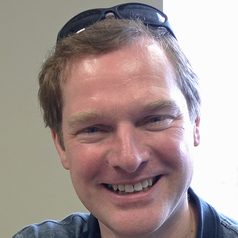
Andrew Maynard
Andrew Maynard is a Professor in the School for the Future of Innovation in Society at Arizona State University, and Director of the Risk Innovation Lab. His research and professional activities focus on risk innovation, and the responsible development and use of emerging technologies. He is especially interested in novel approaches to understanding and addressing risk; effective approaches to developing socially responsive, responsible and beneficial technologies; understanding and responding to the increasingly complex couplings between converging technologies and society; and effective science communication and engagement – particularly through social media. Through the ASU Risk Innovation Lab, he is exploring novel ways of understanding, thinking about and acting on risk from an entrepreneurial and innovation perspective. He is interested in understanding how risk as a “threat to value” shapes evolving risk landscapes around emerging technologies – especially where the value under threat is social, cultural and personal – and how creativity and serendipity can reveal new approaches to navigating these landscapes.
Andrew is widely published in the academic press and in public media. His peer review papers stretch from physics and toxicology to risk perception, governance, and policy. He also contributes to a regular column in the journal Nature Nanotechnology (where he writes on emerging ideas and research around nanotechnology and risk), and writes for the column “Edge of Innovation” on the news and commentary website The Conversation. In addition, he directs and produces the YouTube science education channel “Risk Bites”.
Andrew’s science training is in physics – specializing in nanoparticle analysis – and for many years he conducted and led research on aerosol exposure in occupational settings. In the early 2000’s he became increasingly involved in guiding US federal initiatives supporting nanotechnology research and development, and in addressing potential risks. In 2005 he became Chief Science Advisor for the Project on Emerging Nanotechnologies (and later the Synthetic Biology Project) at the Woodrow Wilson International Center for Scholars, and for five years helped inform national and global initiatives addressing the responsible development of nanotechnology. Over this period, he became increasingly interested in science communication and science policy, and began working closely with academics, policy makers, industry, non-government organizations, and journalists, on science-informed decision making. This interest continued between 2010 - 2015 as Director of the University of Michigan Risk Science Center, and Chair of the Environmental Health Sciences Department. In 2015 he joined the faculty of the School for the Future of Innovation in Society at Arizona State University to continue his work and collaborations on socially responsible, responsible and beneficial research and development.
In the course of his work, Andrew has testified before congressional committees, has served on National Academy panels, and has worked closely with organizations such as the World Economic Forum and the International Life Sciences Institute (ILSI) that promote public-private partnerships. He is currently co-chair of the World Economic Forum Global Agenda Council on Nanotechnology, and on the Board of Trustees of ILSI North America. He is also a member of the National Academies of Science Committee on the Science of Science Communication, and advises the science education/engagement program “I’m a Scientist”. While at the University of Michigan he was involved with the innovative science communication training program RELATE, and continues to serve as an advisor to the initiative. In 2015 he was awarded the Society of Toxicology Public Communication Award.

Dear Elon Musk: Your dazzling Mars plan overlooks some big nontechnical hurdles
Oct 02, 2017 05:32 am UTC| Insights & Views Science
Elon Musk has a plan, and its about as audacious as they come. Not content with living on our pale blue dot, Musk and his company SpaceX want to colonize Mars, fast. They say theyll send a duo of supply ships to the red...
Is lead in the US food supply decreasing our IQ?
Jun 16, 2017 04:49 am UTC| Insights & Views Health
The environmental advocacy group Environmental Defense Fund (EDF) on June 15 released a study about dietary lead exposure, with a focus on food intended for babies and young children. Using a Federal Drug Administration...
It'll take more than tech for Elon Musk to pull off audacious new Tesla master plan
Jul 26, 2016 06:15 am UTC| Insights & Views
Elon Musk CEO of Tesla Motors has just revealed the second part of his master plan for the company. And its a doozy. Not content with producing sleek electric cars (which to be fair, was only ever a stepping stone to...

Nanoparticles in baby formula: should parents be worried?
May 17, 2016 16:34 pm UTC| Health Science
Theres a lot of stuff youd expect to find in baby formula: proteins, carbs, vitamins, essential minerals. But parents probably wouldnt anticipate finding extremely small, needle-like particles. Yet this is exactly what a...
- Market Data








































